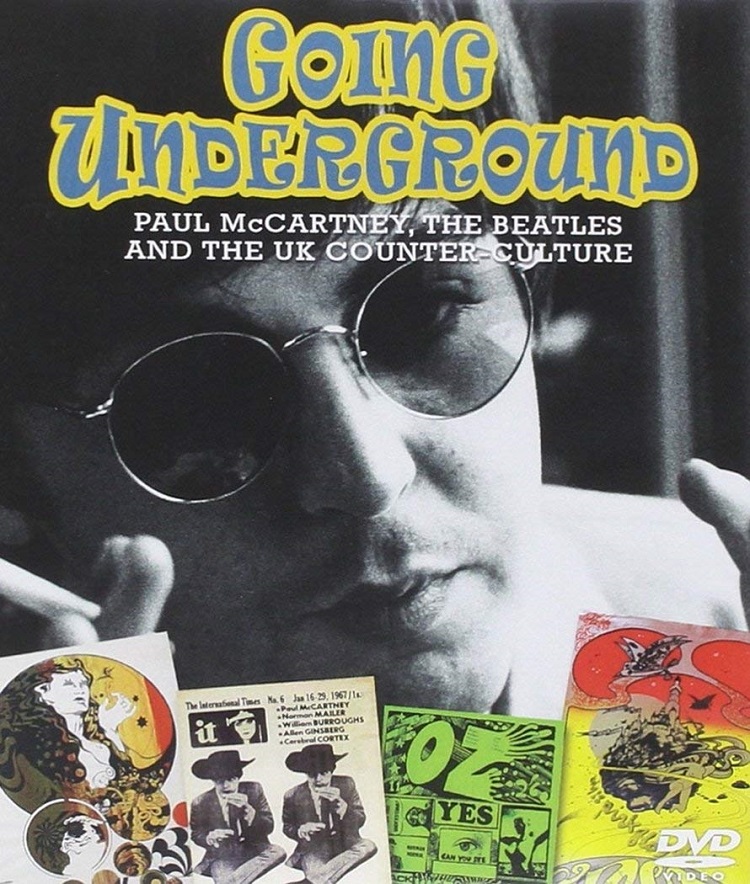
In 1960s England, an underground art movement greatly influenced worldwide pop culture. Emerging from 1950s nuclear disarmament protests and the frank American beat poets, this counterculture trend ultimately rebelled against prevailing conservatism. Attitudes toward sex, politics, art, and music changed, becoming more liberal. Jazz musicians such as Thelonius Monk, Dizzy Gillespie, Charlie Parker, and Ornette Coleman also played a part in this rebellion, as their music often deconstructed the traditional form to create a looser, more freeform version. In turn, these transformations hugely impacted the Beatles’ music. Going Underground: Paul McCartney, the Beatles and the UK Counter-Culture examines this period through archival footage and interviews with figures from the underground, lending a new perspective to what some consider an artistic renaissance.
The documentary interweaves the counterculture movement’s history with the Beatles’ story, demonstrating how the two interacted. The film includes interviews with key figures such as McCartney friend and International Times editor Barry Miles, Indica Gallery owner John Dunbar, and UFO nightclub founder and Pink Floyd producer Joe Boyd. Through their interesting anecdotes, they thoroughly explain how culture changed through rebellion, and demonstrate how these activities directly impacted McCartney and the rest of the band. Originally drawn in by Miles and Dunbar, McCartney immersed himself in the avant garde movement before Lennon. The film illustrates how composer John Cage influenced “A Day in the Life” and how psychedelic figure Timothy Leary inspired “Tomorrow Never Knows.” Sgt. Pepper’s Lonely Hearts Club Band also incorporated these movements while still remaining accessible to the general public. The infamous outtake “Carnival of Light” is also discussed as the Beatles’ full-on exploration of unconventional music.
Drugs played a major part in the counterculture, and Going Underground posits that 1967 drug busts were an attempt to quash the movement. While Keith Richards and Mick Jagger were arrested for drug possession, McCartney remained open about his LSD use. Nevertheless other bands such as Pink Floyd began distancing themselves from these so-called radicals, fearing legal prosecution. Interestingly, they continued recording avant garde music; they simply dissociated themselves from the underground’s leaders.
McCartney soon ended his flirtation with psychedelia shortly after manager Brian Epstein’s death. The Magical Mystery Tour film and album represent the last gasp of their experimentation, soon thereafter, they decided to “return to their roots” through the White Album and ill-fated Get Back/Let It Be sessions. Despite McCartney’s waning interest in the movement, Lennon became involved through his future wife Yoko Ono. The couple subsequently recorded edgy works such as Two Virgins, Life with the Lions, and Wedding Album, and Lennon insisted on another experimental track, “Revolution 9,” being included on the White Album. Yet the documentary points out that McCartney has periodically incorporated electronic and freeform elements of the movement, most notably on McCartney II and his Fireman projects.
Going Underground ends too abruptly, but until that point serves as a fascinating introduction to a particular period in pop culture. Anyone interested in learning more about sociological aspects of the 1960s and how they affected music will enjoy this surprisingly thorough documentary. Extra features include extended interviews and a short feature comparing US and UK psychedelia.